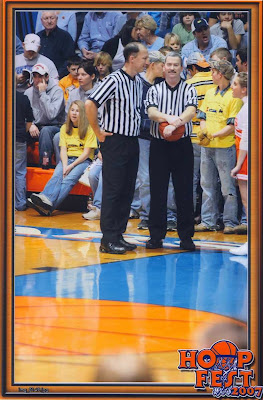
From one of my most favorite Saturday Night Live skits:
Reverend Dwight Henderson: World's Meanest Methodist Minister
Rev. Dwight Henderson.....John Lithgow
Secretary.....Nora Dunn
Paul.....Kevin Nealon
Barbara.....Victoria Jackson
Janet.....Jan Hooks
Marvin Hill.....Dana Carvey Announcer
Announcer: It's time for another episode of "Reverend Dwight Henderson: World's Meanest Methodist Minister".
Reverend Dwight Henderson: [ dictating a letter to his Secretary ] "My Dear Mrs. Randall: Regarding your invitation for Easter dinner - in someithng akin to a nightmare, I imagine myself seated with you and your..
grotesque family, suffering through an evening of what passes for conversation in your household. And the
horror of that image compels me to shun your home, Madam, as I would some kind of dread skin disease." Mmm.. "Yours, with best wishes for this holiday season.. blah, blah, blah.. Reverend Dwight Henderson." Oh, and uh.. "P.S. Enjoy your turkey and Cheese Whiz."
Secretary: I'll get this in the mail today, Reverend.
Reverend Dwight Henderson: [ sighing ] Oh, Rose.. I'm so
desperately tired. Why don't we call it a day?
Secretary: But, Reverend, it isn't noon yet, and there's some people waiting to see you, they've been waiting all morning.
Reverend Dwight Henderson: Honestly, can there be a job on earth more difficult than
mine? Show them in.
Secretary: [ goes to the door and lets a couple enter the Reverend's office ] Uh, Reverend, these are the Marchinsons - Paul and Barbara.
Barbara: Morning, Reverend.
Paul: Morning, Reverend.
Reverend Dwight Henderson: [ not interested in the formalities ] Yes, yes.. you have a problem of some kind?
Paul: Uh, yes, Reverend.. [ fidgety ] Barbara and I were, were married.. uh.. two years ago.. uh.. and lately.. lately..
Reverend Dwight Henderson: Please. Get on with it.
Barbara: Uh, Reverend, our marriage has notbeen going on too well lately.. and before we went into a professional counselor, we thought we would ask you for your advice.
Reverend Dwight Henderson: Madam, as a minister of the gospel, of course I recognize the importance of the institution of holy matrimony. At the same time, however, I must tell you that it simply is
not a subject which interests
me. Next! Next!
[ the Marchinsons are marched out, as the next member of the congregation is brought in ]
Secretary: Reverend, this is Janet Whitmeer..
Janet: Good morning, Reverend!
Reverend Dwight Henderson: Yes?
Janet: Uh, Reverend.. I live alone with my mother..
Reverend Dwight Henderson: Yes?
Janet: And, uh.. she's an invalid, and during the day I have to leave to go to work..
Reverend Dwight Henderson: [ annoyed ] I
trust this is
leading somewhere..?
Janet: Well.. Reverend, she has a heart condition, and I worry if something should happen.. [ Reverend Henderson mimes playing the violin in sarcasm ] ..while I'm not there. And so I was wondering if perhaps someone from the parish could just drop by and check up on her from time to time?
Reverend Dwight Henderson: [ mocking ]
Someone? Don't you mean "Reverend Henderson"? Sure, why spend money on a nurse. We'll get Reverend Henderson to do it for
free! Sure! He's
happy to spend his days running all over town entertaining all our local
shut-ins! He's got nothing
better to do!
Janet: [ aghast ] Reverend, I didn't mean
you.. I.. I..
Reverend Dwight Henderson: [ upset ] Oh,
away with you!
[ Janet is pushed outside, and the next member of the congregation enters ]
Secretary: Marvin Hill.
Reverend Dwight Henderson: [ perturbed ] Yes..
Marvin Hill: [ carrying Easter basket ] Good morning, Reverend. I'm not here on account of any problem.. although, things haven't been going too well for us since I got laid off. But I just came by to wish you a Happy Easter, and to drop off this Easter basket that the wife made..
Reverend Dwight Henderson: [ miffed at the annoying gesture ]
Puh-leeeeze!Marvin Hill: ..and to say hello from Joan and myself.. well, actually, Joan.. uh..
Reverend Dwight Henderson: [ waves him off ] Dismissed! [ walks away ]
Marvin Hill: Thank you. Thanks a lot. Thank you. [ exits ]
Reverend Dwight Henderson: [ back at his desk ] Rose, you know it's been a few weeks since we've gone over the accounts for the Sunday collections.
Secretary: Well, Reverend, there really hasn't been much to count.
Reverend Dwight Henderson: I see. Well, how much was turned in?
Secretary: Well,
actually, Reverend,
nothing was turned in. As a matter of fact, nothing has been turned in for the last three Sundays. I think it may be part of an organized protest.
Reverend Dwight Henderson: [ shocked and disturbed ] I'm afraid you've
lost me! A protest against
what?
Secretary: Reverend Henderson, forgive my bluntness, but you should be aware that you are not liked by some members of the parish.
Reverend Dwight Henderson: Well, of course. They're
cattle!Secretary: Well, Reverend, the fact is that a great many people find your tone sort of
off-putting. The Methodists in this community are used to a more conventional style ministry.. you know, someone who's a lot more polite, and not such a..
butthole.
Reverend Dwight Henderson: [ takes it in ] I see. Tell me, Rose.. why do you work for me? You know, I don't pay you.
Secretary: Because.. [ pause ] I
love you!
Reverend Dwight Henderson: [ absorbs the sudden information ]
Puh-leeeeze! Spare me!Announcer: This has been another episode of "Reverend Dwight Henderson: World's Meanest Methodist Minister".

Originally aired: April 11, 1987






































